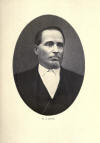
 William
A. Kays, a resident of Putnam county for more than a half century, was born
in Indiana, September 2, 1828, a son of William Kays, a native of Kentucky,
who came to Illinois in 1835, locating in Knox county, where his subsequent
years were passed. William Kays, Sr., the grandfather of our subject, lived
for several years in Putnam county, dying at the home of his son Henry, near
Magnolia.
William
A. Kays, a resident of Putnam county for more than a half century, was born
in Indiana, September 2, 1828, a son of William Kays, a native of Kentucky,
who came to Illinois in 1835, locating in Knox county, where his subsequent
years were passed. William Kays, Sr., the grandfather of our subject, lived
for several years in Putnam county, dying at the home of his son Henry, near
Magnolia.
William A. Kays was a youth of only seven years when his parents removed
from Indiana to Illinois, and his boyhood days were spent upon the home farm
in Knox county, while in the country schools he acquired his early education
and later attended a Presbyterian high school. When twenty-one years of age
he became a factor in commercial life by establishing a grocery business,
which he conducted at Saluda, Illinois, for about three years. Prior to this
he made a trip to the west, traveling through Kansas, and slept one night in
the home of John Brown, the noted abolition leader, who was then living
between St. Louis and Kansas City. In 1850 Mr. Kays arrived in Putnam county
in company with an uncle, Henry Kays, and in the succeeding winter made for
him eleven thousand rails. He then rented land and engaged in farming on his
own account, and when his labors had brought to him sufficient capital he
made purchase of eighty acres of land, upon which he resided until about
twelve years ago, when he sold out and bought one hundred acres where he now
lives in Hennepin township. Throughout the period of his residence in this
county he has carried on general agricultural pursuits, which he has found
to be a profitable source of income, as his labors have been directed by
sound judgment and characterized by unremitting diligence.
In 1850 Mr. Kays was married to Miss Olive Haley, a native of Putnam county,
who died April 29, 1900. He later wedded Miss Nancy Mills, of Putnam county,
who still survives. By the first marriage there were eight children: Ellen,
now deceased : Mrs. Sarah Purviance, now living in Kansas; James B., of
Missouri; Mrs. Amanda Burns, of Kansas; Alice, the wife of H. H. Edwards, of
Hennepin township ; William H., of Tonica, Illinois; Olive, the wife of J.
B. Davis, of Peoria, this state; and Mary Belle, deceased. By the second
marriage there is one son, Wesley Kays.
In early life Mr. Kays joined the Methodist Episcopal church, and has ever
endeavored to follow closely the principles and precepts of Christianity.
For thirty-two years he has been secretary of the Mineral Springs
Association, which holds a camp meeting at McNabb each year. He purchased
the land for this purpose through an order of the conference of the
Methodist Episcopal church and held it until the association was able to
repay him. He has always been very active in religious and political life.
His first presidential vote was cast for Franklin Pierce, and he has always
been a stanch democrat where national issues are involved, yet at local
elections often casts an independent ballot. He is now and has been for
forty-seven years chairman of the democratic county central committee, and
has done effective work in behalf of the party, being recognized as one of
its leading representatives in this part of the state. He was also chairman
of the central committee while living in Knox county, and was on the stage
with Lincoln and Douglas when they held their joint debate in Galesburg.
His father enlisted and fought in the Mexican war, and at the time of the
trouble with the Mormons in Illinois William A. Kays enlisted and served for
four months with the company that fought Joseph Smith and compelled him to
come to Peoria for trial and later to leave Illinois. At the time of the
Civil war he drilled for three months, intending to join an Illinois
regiment, but the troops were gone when he arrived at Galesburg and he did
not therefore have the opportunity of going to the front. He has in his
possession an adz used by a man of the name of Humiston in trying to find
the stone tablets left by the Mormons. Mr. Kays has closely followed the
golden rule, doing unto others as he would have them do unto him, and no man
is spoken of in higher terms by his neighbors than the subject of this
review. He receives the respect and veneration which should ever be accorded
to a man of his years whose life has been exemplary and whose principles
have been most commendable.
Source: Past and Present of Marshall and Putnam Counties Illinois authored by John Spencer Burt and W. E. Hawthorne in 1907, page 132.
| Bureau |  |
LaSalle |
| Marshall |

